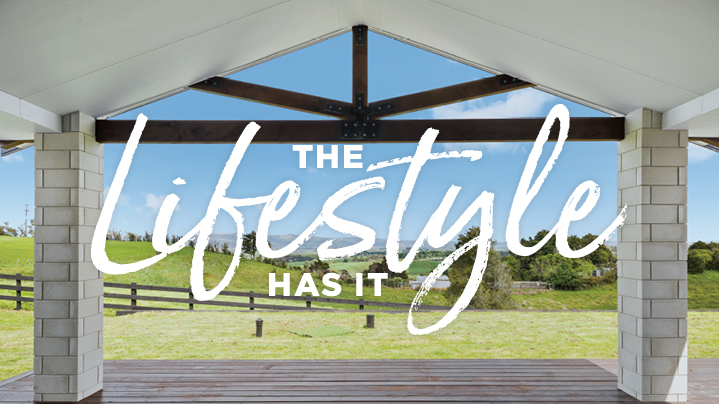The lifestyle has it
NZ’s lifestyle property market has performed with strength through the pandemic with an increasing number of buyers looking to rural properties for value. Bayleys regional general manager – Lifestyle, explains what keeps attracting new attention to the sector.
Sustained interest in the lifestyle sales sector has seen 49 percent more properties sold in the year to July 2021 when compared year-on-year, feeding heightened interest in the sector, says Raymond Mountfort, Bayleys regional general manager – Lifestyle.
“Lockdown restrictions have had a huge impact on the way New Zealanders now want to live, with pandemic-related assessments of their homes and lifestyles encouraging more Kiwis to look for something outside the traditional urban home,” he says.
“Bayleys Lifestyle sales teams across the country are noting rising demand for larger more luxurious homes, with a bit of land to play with and enough room for the kids, animals and the toys,” Mountfort adds.
Alongside healthy commodity prices, demand for New Zealand’s exports and greater global investment into climate change, more Kiwis are also looking at the lifestyle the benefits of living in rural areas.
“Kiwis too, are interested in using their homes as hobby farms, with the rising costs of goods and services a motivating factor to squeeze more out of every dollar,” Mountfort adds.
EXPATRIATE INTEREST
Despite the high-profile difficulties facing expatriate Kiwis wanting to get back across the border, enquiry from overseas-based residents looking to return home continues with consistency.
“New Zealand’s stable political climate and ‘safe haven’ status, alongside our initial pandemic response, has made a lasting impression for buyers based offshore, especially those seeking the land and lifestyle they can’t get in more built-up areas like London and Singapore,” Mountfort says.
In its recent Global Buyer Survey, Bayleys strategic partner Knight Frank found that 39 percent of the expatriates surveyed have purchased a home in their country of origin since the start of the pandemic, which matches Bayleys own website analysis of offshore enquiry.
For Kiwis that have already returned home, the switch to more agile working environments following prolonged lockdown restrictions raises more questions about the need to live close to the city.
For Kiwis that have already returned home, the switch to more agile working environments following prolonged lockdown restrictions raises more questions about the need to live close to the city.
“Expatriate Kiwis are returning home with a little more cash in their pockets, and after living in bustling cities some are finding better value for their children and families in a move away from city areas,” Mountfort says.
Increased government investment on the state highway and local road networks across the country, as well as other critical infrastructure that continues to improve rural access and connectivity, are further adding to the appeal of lifestyle properties.
GROWING POTENTIAL
New Zealand’s horticultural industry has remained strong despite the recent economic disruption of a global pandemic, with the sector reporting record export value growth and a growing number of Kiwis looking to enter the industry.
With a target of $1 billion in sales set for 2040, New Zealand’s strengthening avocado industry is attracting new investors thanks to a relatively affordable entry-level price for a home and small orchard when contrast with other more established fruit varieties.
Generating some $200 million in sales last year and rising in value by more than 66 percent in the last decade, New Zealand’s avocado industry is set for big growth with budding orchardists taking notice.
North of Auckland, there has been some movement with dry pastoral and dairy land converted for use as avocado orchard operations.
Large commercial operators are working with local Iwi to establish agreeable industry settings, while a preferable growing climate, water supply and well-draining soil make for an ideal crop establishment in the north.
Future projections anticipate Northland’s avocado industry will soon share an even orchard split with another key growing area, the Bay of Plenty.
HOME & INCOME POTENTIAL
The romantic notion of an escape to the country has been a big contributor to New Zealand’s global appeal as a holiday destination, but with borders closed until we improve our vaccination rates, the focus of farm tours and lifestyle vacations remains domestic.
Despite this, lifestyle property owners are capitalising on calls for Kiwis to explore more of their own backyards, which unlocks further potential for the lifestyle sales sector.
“Our lifestyle team is seeing a growing number of buyers looking for a larger home on bigger sites with extra accommodation for family, guests or as income-producing potential,” Mountfort says.
“Our lifestyle team is seeing a growing number of buyers looking for a larger home on bigger sites with extra accommodation for family, guests or as income-producing potential,” says Raymond Mountfort, Bayleys regional general manager - Lifestyle
Landowners with existing guest accommodation or the potential to create and develop this are netting good returns on their investment with the ease and ability for ordinary Kiwis to secure additional income on platforms including Airbnb.
“Busy urban lifestyles have meant more holiday-makers are seeking an escape, and the rise of digital booking platforms have meant landowners are now able to make the most of the income-producing opportunities this affords,” Mountfort says.
Mountfort says it’s an exciting time for the lifestyle sales market with heightened interest across the board from fast-moving one hectare-plus lifestyle properties adjacent to urban boundaries offering ex-city slickers a reprieve from the rate race to larger land sites open to a multitude of uses across the country.
“Extended lockdown restrictions have served to underpin a Kiwi focus on home improvements with a little more land very high on the Christmas wish list,” he adds.
Read more...
[Download PDF]